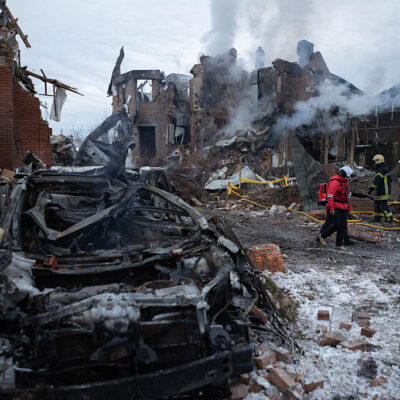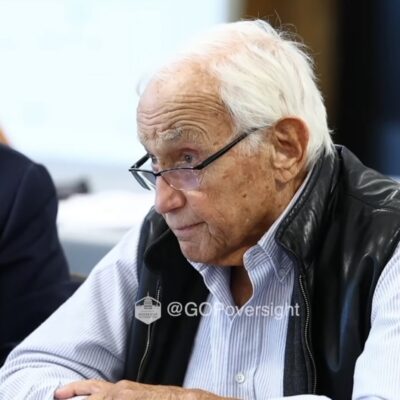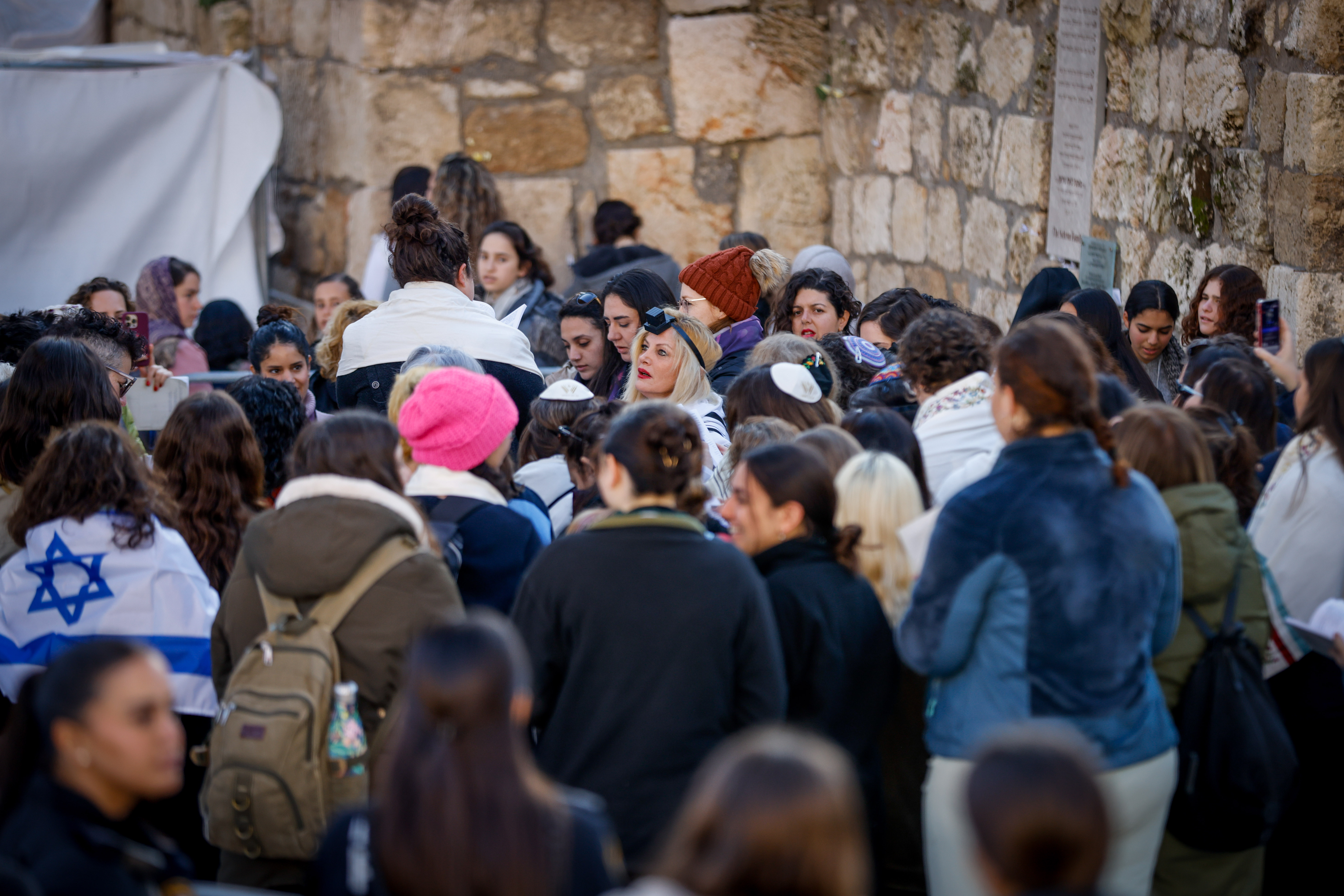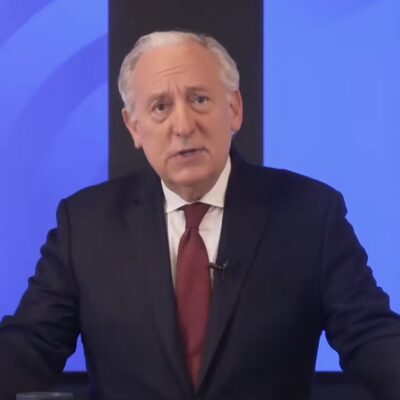Your Daily Phil: Returning to a divided Israel, Conf. of Presidents stresses unity
Good Wednesday morning.
In today’s edition of Your Daily Phil, we report on the Conference of Presidents’ ongoing mission to Israel and on a recent Russian drone strike that damaged one of IsraAid’s water purification stations in Ukraine. We interview outgoing Foundation for Jewish Camp CEO Jeremy Fingerman, and feature an opinion piece by Rabbi Rachel Isaacs about the spiritual and social imperatives of connecting Jews in America’s small towns with access to the basic resources for Jewish life. Also in this newsletter: Gila Tolub, Jonathan Dekel-Chen and Michael and Tanya Polsky.
What We’re Watching
The Conference of Presidents of Major American Jewish Organizations, on its annual mission to Israel, is in northern Israel today for a series of security briefings and meetings with civil society leaders. More on the mission below.
The Altneu Synagogue on Manhattan’s Upper East Side is hosting a Torah class this morning by Rav Shaul Alter, the founder and leader of the Kehilas Pnei Menachem Hasidic community, who is visiting the United States from Israel.
Israeli President Isaac Herzog traveled from Hungary to Italy today where he will hold diplomatic meetings with Italian President Sergio Mattarella, Prime Minister Giorgia Meloni and Foreign Minister Antonio Tajani. Herzog will also address an event with Italy’s Jewish community at the Great Synagogue of Rome.
What You Should Know
When the Conference of Presidents of Major American Jewish Organizations visited Israel on its annual mission last year, some four months after the Oct. 7 terror attacks as the war against Hamas in Gaza was at its peak, the attendees were unified in their message to the Israeli leaders they encountered: We are with you, no questions asked, report eJewishPhilanthropy’s Judith Sudilovsky and Judah Ari Gross.
Conference of Presidents CEO William Daroff told eJP at the time that the participating leaders — like everyone — wanted to know how the Israeli military had failed to prevent or at least adequately respond to the massacres. “But I have not heard any second-guessing of Israel’s war policies, security policies or how they’re conducting the war at all,” he said.
One year later, during the five-day mission underway now, there is no shortage of second-guessing Israel’s policies, particularly as it relates to the current hostage-release and cease-fire agreement and President Donald Trump’s longer-term proposal for the United States to “take control” of Gaza and relocate all of its inhabitants — a notion that most Israeli leaders have wholeheartedly embraced, at least as a jumping-off point, while most American Jews are far warier of the idea. These issues represent sources of division both within the American Jewish community and within Israeli society, as well as between American Jewry and Israel.
Yet participants did not describe the debates taking place, however serious, as antagonistic or harsh, but rather as critical tools for the different sides to better understand one another, even if they do not end up agreeing.
“We’re here at a very precarious and important moment… which will see a combination of both the good and the bad where we’re [going to see] the body bags that are going to come back on Thursday [with slain captives] and hopefully the hostages who are still alive that will be returned on Saturday. So we’re seeing both sides of the emotional spectrum,” Amy Spitalnick, CEO of the Jewish Council for Public Affairs, told eJP on the sidelines of the conference in Jerusalem yesterday. “I think we’re also seeing how that’s playing out in Israeli politics and in both the unity in the Jewish community.”
These differences were perhaps most evident on the first night of the mission, which featured a speech from Prime Minister Benjamin Netanyahu, in which he described Trump’s plan as “right on the dot.” Before the prime minister’s speech, Amichai Chikli, Israel’s minister for Diaspora affairs and combating antisemitism, told the crowd that he opposed the current, limited stage of the hostage-release deal and said he would work to prevent further stages of the agreement that would secure the release of all of the remaining captives, on the grounds that the cost in terms of the number of Palestinian terrorists who would be released was too high a price to pay.
“The majority of American Jews agreed with that deal and want the hostages to be prioritized and believe that Judaism makes a compelling case for the redeeming of captives as one of the highest [priorities],” said Sheila Katz, CEO of the National Council of Jewish Women.
Mort Klein, national president of the Zionist Organization of America, was one of the lone voices in the conference who supported Chikli’s viewpoint, telling eJP that he too opposes the hostage-release deal under the belief that it incentivizes further attacks on Jews. Klein acknowledged that he represents the minority of American Jews in these matters. “At the Conference of Presidents, [the representatives] are Jews, and they really reflect American Jewry. So most people here are liberals, most people here are Democrats. I am not one of them.”
Stephanie Hausner, the chief operating officer of the Conference of Presidents, said this type of debate, even if pointed, between American Jewish leaders and Israeli leaders is precisely the point of the trip. “Minister Chikli took a lot of time for questions. Eight or so people asked questions, and they were very directed at the hostage situation, why he didn’t vote for it. And there are a few different questions related to that and some of the comments he made also regarding Islamophobia,” she said. “I think people were given the opportunity to express themselves.”
Herbert Block, executive director of the American Zionist Movement umbrella group, agreed that the discussion was the most important aspect of the meetings, not that anyone necessarily changed their mind. “It’s important to have that conversation and to have that dialogue regardless of whether any particular organization agrees with the particular minister or government officials speaking. So being here and showing that the American Jewish community is engaged and listening and respectful and having a dialogue and sharing viewpoints is important,” he said.
“There’s unanimity among organizations of the prioritization of getting the hostages out. That’s top of mind for everybody,” Block said. “There are differing views on the Trump plan. But everyone wants to defeat Hamas. Everyone wants peace for the southern border.”
COSTS OF WAR
Russian drone hits IsraAid water purification station in southern Ukraine

A Russian drone strike over the weekend caused significant damage to a water purification station that had been set up by the Israeli humanitarian relief group IsraAid in a southern Ukraine village, knocking out the system, which provided water for roughly 1,000 people, for at least several weeks, a Ukrainian spokesperson for the group told eJewishPhilanthropy’s Judah Ari Gross yesterday.
‘A bit devastating’: The village, Mykolaivska, just outside the city of Mykolaiv, had received the reverse osmosis system in late October 2023. The roughly 1,000 villagers who relied on it for free, unlimited water will now have to revert to receiving water in bottles and trucked-in containers, meaning water will again be rationed, according to Anna Pantiukhova, IsraAid’s communication officer in Ukraine. “Getting back the hope that things are going back to normal and then having that taken away is almost even more cruel than not giving the assistance in the first place,” she told eJP. Pantiukhova noted that Mykolaivska has also been affected by the U.S. government’s USAID freeze. “They have at least 3 [USAID] projects that have been frozen,” she said. “All of that within one month is a bit devastating.”
EXIT INTERVIEW
Stepping down after 15 years, Foundation for Jewish Camp CEO Jeremy Fingerman says he’s leaving the field on solid footing

After 15 years at the helm of the Foundation for Jewish Camp, Jeremy Fingerman announced last month that he was stepping down as CEO of the organization. Effective March 1, Fingerman will transition to the role of senior advisor, while the foundation’s chief program and strategy officer, Jamie Simon, will assume the role of interim CEO until the board hires a full-time successor. Before leaving the role, Fingerman, who previously served as a for-profit executive and consultant, sat down with eJewishPhilanthropy’s Nira Dayanim to discuss his time with the organization — steering it through the aftermath of the Great Recession, the COVID-19 pandemic and the current rise in global antisemitism — and his plans for the future, namely with his children in Israel.
ND: After 15 years at the Foundation for Jewish Camp, can you tell me a little bit more about your decision to step down? Why now?
JF: With the intensity of the job, trying to do it for 15 years every day, those pressures and balancing that within what was happening in our family life, it seemed like the right time to step down. I got FJC to a great place. The field is strong. FJC is strong, and so I’m proud of where we are.
ND: There have been increased demands on Jewish educational spaces and Jewish educators this past year. I’m wondering how that’s played out for you and for FJC?
JF: We’re on a roll. We had record enrollment this past summer, and finally reached and then exceeded our pre-pandemic record level of participation, now serving over nearly 190,000 youth, teens and college-age counselors. I’m really proud that we’ve been able to, through “The Surge” and all of the good work that the field has done, the collective effort it took to be able to build back to where we were before the pandemic.
ON THE PERIPHERY
The cost of leaving small-town Jews behind
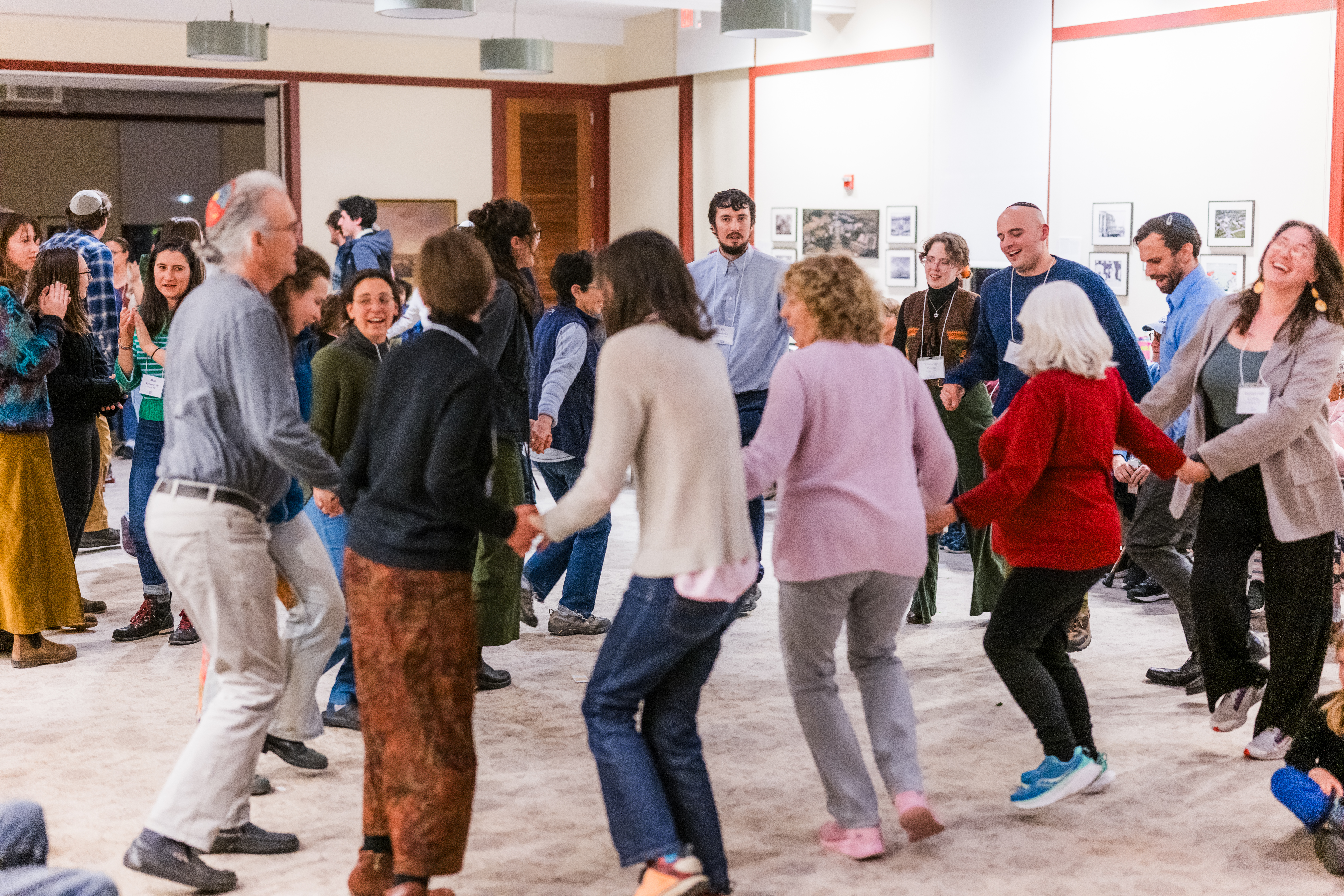
“When quantitative data is the primary or exclusive metric of Jewish success, it rarely makes sense to devote significant resources into small, scattered pockets of largely economically vulnerable Jews. Both by measures of attendance and dollars raised, it will always make sense to invest in large cities with significant population density. If we only focus on those cities, however, we leave behind the 1 in 8 American Jews who live outside of major metropolitan areas,” writes Rabbi Rachel Isaacs, the rabbi of Beth Israel Congregation in Waterville, Maine, and the founder and executive director of the Center for Small Town Jewish Life, in an opinion piece for eJewishPhilanthropy. “In aggregate, small-town Jewish communities add up.”
Cumulative effects: “Our tradition teaches us every Jew is responsible for one another. On a fundamental level, we fail as a people when we do not work to ensure that every Jewish child receives a Jewish education; that every Jew be guided toward joy and meaning in their tradition; that every sick individual in our community receives comfort at their bedside; and that everyone who dies has a rabbi to bury them if that is what they desire… Beyond the spiritual, there is a practical concern. When Jews living in small, rural and remote communities don’t feel connected to the larger community, they are often left with a tragic and worrying sense of alienation. That sense of alienation is often shared by other groups of the margins of Jewish life. According to research done by Eitan Hersh of Tufts University, the young Jews most likely to join encampments protesting the war in Gaza, which often employed antisemitic speech and targeted the presence of Jewish institutions on campuses, were Jews from marginalized demographics… We cannot ignore that there is a clear correlation between those who have organized against Jewish institutions and those who have been traditionally disconnected and alienated from them.”
Worthy Reads
The Next 500 Days: In Haaretz, Avi Dabush calls upon Israelis to catalyze a political leadership transition in the country. “In the 500 days that have passed beginning with the massacre of Oct. 7, 2023, almost 2,000 of our civilians and soldiers have been killed, while tens of thousands of people have been killed in the Gaza Strip and Lebanon. And of the four war goals set by the war cabinet about a week after the Oct. 7 attack, not one has been achieved, certainly not in full… The clear conclusion is that we need a political force that can effect change – not once elections have been called, but now. In January 2023, I organized protests against the government in the Negev. These were the biggest demonstrations the Negev has ever seen. After surviving the Oct. 7 massacre at Kibbutz Nirim and being evacuated to Eilat, I was a partner in organizing protests in Eilat and then in Be’er Sheva, where we are still living as evacuees 500 days later. It’s very important for people to be in the streets, since our only achievements have come as a result of public pressure. But at the same time, protests won’t be enough. The real victory must come at the polling booths.” [Haaretz]
System Upgrade, Please: In The Jerusalem Post, Gila Tolub encourages Israeli policymakers to address critical gaps in Israel’s mental health system following the release of a report on the subject by the state comptroller. She also thinks the report has some shortcomings. “The report’s claim that PTSD therapy dropout rates in Israel are abnormally high ignores key realities. Unlike global studies conducted in stable environments, Israel’s therapy occurs amid ongoing trauma. Therapy models designed for post-trauma recovery don’t easily apply in wartime. Additionally, the fixation on 36 therapy sessions as a benchmark for success is arbitrary — people recover at different paces, and rigid session counts don’t define effective care. The report rightfully flags long wait times but fails to acknowledge that no system could have been fully prepared for the scale of Oct. 7 — 124,000 evacuees, mass casualties and widespread displacement. Volunteers, many of them trained professionals, played a critical role in bridging the gap. The real issue was the slow allocation of government funds, which left the mental health response reliant on philanthropy. Future preparedness must prioritize a step-care model, training non-specialists, and establishing a rapid-response mental health reserve… The question isn’t whether Israel’s response has been perfect — it hasn’t. The question is whether we will use this moment to build a stronger, more resilient mental health system — one that reflects the realities of war, integrates mental health data, expands community-based care, and leverages technology to scale solutions.” [JPost]
Word on the Street
Jonathan Dekel-Chen, the father of American-Israeli Sagui Dekel-Cohen who was released from Hamas captivity on Saturday, spoke in an interview on NewsNation’s “Morning in America” about getting his son back almost 500 days after he was kidnapped. “He has been, in a sense, sort of born again as a human being in the world that we inhabit. And that’s joyous. It’s joyous for himself. It’s joyous for his wife, his three little girls, and our family, our community,” he said…
Violent clashes broke out last night at an anti-Israel protest in the Borough Park neighborhood in Brooklyn, N.Y., which is home to a large Orthodox Jewish population. The protest organizers issued a call to “Flood Boro Park to stop the sale of stolen Palestinian land” and its participants hurled offensive slurs at Jewish residents of the neighborhood and counterprotesters…
Michael and Tanya Polsky have donated $100 million to the World Resources Institute (WRI) and the University of Chicago through the Polsky Foundation to advance scalable solutions for the global energy transition and foster future energy leaders. A $75 million portion of the gift, the largest energy-focused donation in WRI’s history, will establish the WRI Polsky Center for Global Energy Transition, which will leverage global expertise to drive the transition to clean, affordable and reliable energy…
A ceremony marking the 76th anniversary of the closure of British internment camps in February 1949 was held in Nicosia, Cyprus, on Tuesday with descendants of Holocaust survivors who were detained there in attendance…
Lauren Grossman, has been named as Midwest director of development for the Alpha Epsilon Pi Foundation…
The Chronicle of Philanthropy looks at the results of a study by the Center for Effective Philanthropy that highlights the significant effect unrestricted grants from MacKenzie Scott have had on numerous nonprofits…
A new study by researchers Abhishek Bhati and Diarmuid McDonnell found that using multiple strategies during online fundraising campaigns helps nonprofits receive more donations, and may also reduce donor fatigue…
New data from the American Jewish Committee (AJC) and Hillel International’s AJC’s State of Antisemitism in America 2024 Report shows that 32% of American Jewish college students feel faculty have promoted antisemitism or created a hostile learning environment for Jews…
Israeli Minister of Education Yoav Kisch met with Columbia University Interim President Katrina Armstrong to discuss antisemitism on campus and strengthening U.S.-Israel academic collaboration…
Haaretz examines the trend of Israelis turning to religious services outside the state-run Chief Rabbinate, which is increasingly viewed as a coercive authority under the current government…
Leonard H. Cohen, former president of Congregation Knesset Israel in Pittsfield, Mass., and renowned lawyer in the Northeast, died last week at 89…
Pic of the Day

A woman walks today in front of a mural in Tel Aviv of the Bibas family — Yarden, Shiri, Ariel and Kfir — who were kidnapped by terrorists in the Oct. 7 attacks, a day after Hamas said that the bodies of Shiri, Ariel and Kfir would be returned to Israel on Thursday as part of the hostage-release deal. Yarden Bibas, who was held separately from his family, was released from Hamas captivity earlier this month. Israel has never confirmed that Shiri, Ariel and Kfir had been killed.
The Bibas family responded to the announcement saying that it had thrown them into “turmoil” and that “until we receive definitive confirmation, our journey is not over.”
Birthdays

Founder and president of the eponymous Laurie M. Tisch Illumination Fund, she is on the boards of the NFL’s NY Giants, Lincoln Center for the Performing Arts and the Aspen Institute, Laurie M. Tisch…
2004 Nobel Prize laureate in physics, he is a professor at the University of California, Santa Barbara, David Jonathan Gross… Former chairman of the board and CEO of Sony Corporation, chairman of the board of trustees of the American Film Institute, Sir Howard Stringer… Retired co-founder of integrated digital marketing agency Hawkeye / Mosaic, now known as Publicis Hawkeye, Sharon Edelman… Former president of the Technion Israel Institute of Technology from 2009 until 2019, Peretz Lavie… Co-founder and CEO of Atria, Alan Tisch… Managing partner of Encino, Calif.-based Hager Pacific Properties, Adam Tuvia Milstein… Former Goldman Sachs partner and then a senior executive at JPMorgan Chase, he now serves on various corporate and non-profit boards, Barry L. Zubrow… International CEO of Taglit Birthright Israel since 2008, Gidi Mark… Novelist, essayist and short story writer, he was a winner of a 2005 MacArthur genius fellowship, Jonathan Allen Lethem… Retired U.S. District Court judge, he was a law clerk for Justice Anthony Kennedy (1993-1994) alongside future justices Neil Gorsuch and Brett Kavanaugh, Gary Scott Feinerman… Senior vice president of government relations at Las Vegas Sands Corp., Andy Abboud… Co-founder of the band Phish where he was the lead drummer and frequent song writer, Jon Fishman… Former communications director for 27 years for U.S. Sen. Lindsey Graham (R-SC), now a consultant, Kevin D. Bishop… Chairman of the World Zionist Organization, Yaakov Hagoel… Canadian media personality, writer and activist, Ezra Levant… Partner at InfraStrategies and senior fellow at the UCLA Institute for Transportation Studies, Joshua Levi Schank, Ph.D…. Founder of NYT’s DealBook and CNBC anchor, Andrew Ross Sorkin… Hollywood writer and producer, Gideon Yago… Jewish rapper, part of the alternative hip hop group Darshan, better known by his stage name Eprhyme (pronounced “E-Prime”), Eden Daniel Pearlstein… Writer of the “In the Know” gossip column for The Hill, Judy Kurtz Altscher… Founder of a Middle East NGO, Regional Organization for Peace, Economics & Security (ROPES), Ben Birnbaum… Former MLB pitcher for the Phillies (2011-2012), he now runs Big League Advance, a company that invests in minor league players in exchange for a percentage of their future MLB earnings, Michael Schwimer… Samantha Zalaznick… Tight end for the NFL’s Kansas City Chiefs, he played college football at Harvard, Anthony Firkser… Actor who played the young autistic Jacob “Jake” Bohm in the Fox TV series “Touch,” later portraying a young Bruce Wayne in another Fox series “Gotham,” David Mazouz… Daniel Blum…


 Add EJP on Google
Add EJP on Google



